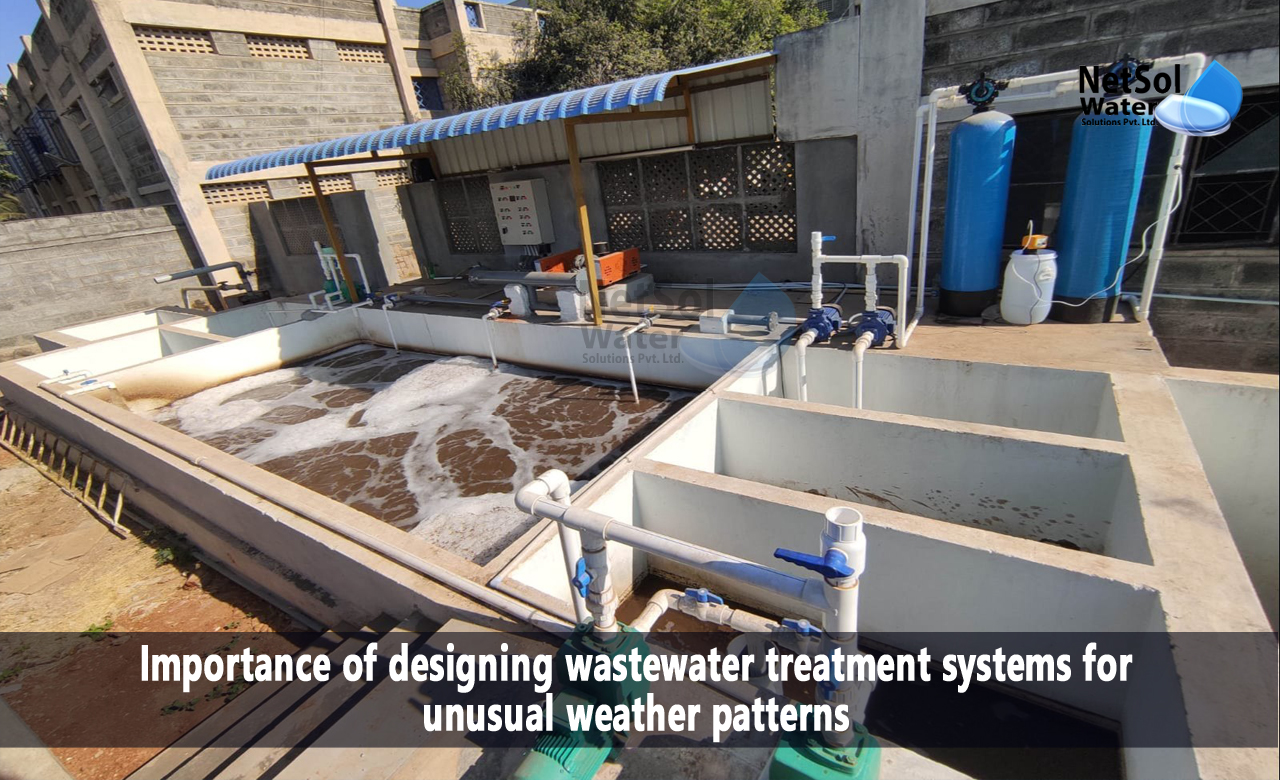What is the Importance of designing wastewater treatment system?
The impacts of climate change are becoming increasingly evident in various aspects of our lives, including the design and operation of wastewater treatment systems. As extreme weather events become more frequent and severe, it is essential that wastewater treatment systems are designed to withstand and adapt to these conditions.
In this blog, we will explore the importance of designing wastewater treatment systems for unusual weather patterns and some of the strategies that can be employed to achieve this goal.
Understanding the Risks:
Before designing a wastewater treatment system for unusual weather patterns, it is essential to understand the risks associated with these events. Extreme weather events such as floods, hurricanes, and droughts can have a significant impact on wastewater treatment systems, leading to equipment failures, disruptions in treatment processes, and environmental damage.
Floods: Floods can overwhelm wastewater treatment systems by causing a surge in flow rates and reducing treatment efficiency. Floodwaters can also carry pollutants and debris, which can damage equipment and clog pipelines.
Hurricanes: Hurricanes can cause significant damage to wastewater treatment systems through high winds, storm surges, and flooding. This damage can lead to system failures, environmental contamination, and public health risks.
Droughts: Droughts can reduce the amount of water available for wastewater treatment, leading to a decrease in treatment efficiency and increased energy consumption. In some cases, droughts can also lead to water shortages, which can impact the ability of wastewater treatment systems to operate effectively.
Designing for Unusual Weather Patterns:
To design a wastewater treatment system for unusual weather patterns, it is important to consider a range of strategies that can help to mitigate the risks associated with these events. Some of these strategies include:
1. Incorporating Resiliency into the System Design: When designing a wastewater treatment system, it is important to consider the potential impacts of extreme weather events and to incorporate measures that can help the system withstand these conditions. For example, designing wastewater treatment plants with flood-resistant features such as raised buildings and equipment, flood barriers, and water diversion structures can help to protect the system from flood damage.
2. Implementing Redundant Equipment and Processes: Incorporating redundant equipment and processes into a wastewater treatment system can help to ensure that the system can continue to operate even in the event of equipment failures or disruptions in treatment processes. This can include duplicating critical equipment such as pumps and adding backup power sources to ensure continuous operation.
3. Developing Emergency Response Plans: Developing emergency response plans can help to ensure that wastewater treatment systems are prepared to respond to extreme weather events. This can include developing plans for shutting down the system during emergencies, backup power and communication systems, and protocols for addressing spills and other environmental hazards.
4. Using Sustainable Treatment Technologies: Sustainable treatment technologies such as membrane bioreactors, constructed wetlands, and decentralized treatment systems can help to increase the resiliency of wastewater treatment systems. These technologies can be designed to operate on less water and energy, making them more sustainable and better able to withstand drought conditions.
5. Regular Maintenance and Upgrades: Regular maintenance and upgrades are essential for ensuring that wastewater treatment systems are functioning at optimal levels and can withstand unusual weather patterns. This can include regular inspections, testing, and cleaning of equipment, as well as upgrades to equipment and processes to improve efficiency and resiliency.
Conclusion:
Designing wastewater treatment systems for unusual weather patterns is essential to ensure that these systems can continue to function effectively in the face of extreme weather events. Incorporating resiliency into the system design, implementing redundant equipment and processes, developing emergency response plans, using sustainable treatment technologies, and regular maintenance and upgrades are some of the strategies that can be employed to achieve this goal. By taking a proactive approach to designing and maintaining wastewater treatment systems, we can help to ensure that these systems can continue to protect public health and the environment in the face of changing weather patterns. As the impacts of climate change continue to unfold, it is important that we prioritize the development and implementation of strategies that can help to improve the resilience of wastewater treatment systems. Furthermore, it is important to note that designing wastewater treatment systems for unusual weather patterns is not a one-time effort but a continuous process. As weather patterns continue to evolve and become more unpredictable, it is essential that wastewater treatment systems continue to be adapted and improved to ensure that they can effectively protect public health and the environment.
Do you need an advice or assistance on selecting the best water and waste water treatment unit? We have solutions for all your problems!
Let us now your problem, our experts will make sure that it goes away.
For an assistance or related query,
Call on +91-965-060-8473
Or write us at enquiry@netsolwater.com



